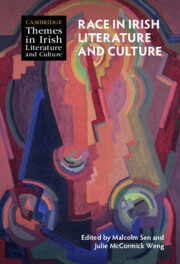Book contents
- Race in Irish Literature and Culture
- Cambridge Themes in Irish Literature and Culture
- Race in Irish Literature and Culture
- Copyright page
- Dedication
- Contents
- Figures
- Contributors
- Editors’ Note
- Introduction
- Chapter 1 “Our Heroic Ancestors”
- Chapter 2 Racializing Irish Historical Consciousness
- Chapter 3 Race, Minstrelsy, and the Irish Stage
- Chapter 4 Race and Irish Women’s Novels in the Long Nineteenth Century
- Chapter 5 Blackface Minstrelsy, Irish Modernism, and the Histories of Irish Whiteness
- Chapter 6 Joyce’s Racial Comedy
- Chapter 7 W. B. Yeats, the Irish Free State, and the Rhetoric of Race Suicide
- Chapter 8 “Ulster’s White Negroes”
- Chapter 9 Learning from Walcott
- Chapter 10 Race, Irishness, and Popular Culture in Australia
- Chapter 11 White Nationalism and Irish America
- Chapter 12 Diasporic Afterlives
- Chapter 13 “Dubh”
- Chapter 14 Split Selves and Double Consciousness in Recent Irish Fiction
- Chapter 15 Race, Place, and the Grounds of Irish Geopolitics
- Select Bibliography
- Index
Chapter 7 - W. B. Yeats, the Irish Free State, and the Rhetoric of Race Suicide
Published online by Cambridge University Press: 04 January 2024
- Race in Irish Literature and Culture
- Cambridge Themes in Irish Literature and Culture
- Race in Irish Literature and Culture
- Copyright page
- Dedication
- Contents
- Figures
- Contributors
- Editors’ Note
- Introduction
- Chapter 1 “Our Heroic Ancestors”
- Chapter 2 Racializing Irish Historical Consciousness
- Chapter 3 Race, Minstrelsy, and the Irish Stage
- Chapter 4 Race and Irish Women’s Novels in the Long Nineteenth Century
- Chapter 5 Blackface Minstrelsy, Irish Modernism, and the Histories of Irish Whiteness
- Chapter 6 Joyce’s Racial Comedy
- Chapter 7 W. B. Yeats, the Irish Free State, and the Rhetoric of Race Suicide
- Chapter 8 “Ulster’s White Negroes”
- Chapter 9 Learning from Walcott
- Chapter 10 Race, Irishness, and Popular Culture in Australia
- Chapter 11 White Nationalism and Irish America
- Chapter 12 Diasporic Afterlives
- Chapter 13 “Dubh”
- Chapter 14 Split Selves and Double Consciousness in Recent Irish Fiction
- Chapter 15 Race, Place, and the Grounds of Irish Geopolitics
- Select Bibliography
- Index
Summary
In 1928-29, politicians of the Irish Free State debated the Censorship of Publications Bill, which included a clause banning print media on contraception. They contended that ignorance of birth control would increase reproductive rates and prevent Irish “race suicide.” W. B. Yeats contested the Bill in the press, in part due to apprehension about Catholic population growth and dwindling Protestant numbers. This chapter positions the Free State’s “race suicide” debates into the context of their eugenic origins, and it argues that Yeats’s reaction to the Bill set the stage for his eugenic plan in On the Boiler, one that responded to what he believed was an Anglo-Irish “race suicide.” Through coded references to Irish class divisions, Yeats proposes restraints on Catholic reproductive rights, strategies of selective breeding among an Irish elite, and population control achieved through violence. His ideas about race and reproduction offer a study of scientific racism that reflects fringe and mainstream rhetoric that endures today in the form of “replacement theory.” An investigation of Yeats contributes to the ongoing, multidisciplinary effort to pinpoint the origins, development, and effects of theories that bring together questions of science, race, reproduction, and rights.
Keywords
- Type
- Chapter
- Information
- Race in Irish Literature and Culture , pp. 143 - 171Publisher: Cambridge University PressPrint publication year: 2024



